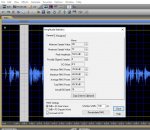Hi,
I am an Italian guy and I have recorded a couple of chapters of an Audiobook and all the editing is pretty much done, I already applied a light Noise reduction and a very subtle noise gate in order to clean the recording from background noise.
After that, I applied a smooth compression using Waves Rcompressor plugin a friend of mine gives me as a present … and the result is the one that you can hear with the sample I am attaching to this post. (Sorry if the audio is in Italian language but this should not be a big problem about just audio quality and its sound. At least I hope so….)
But from here, I a still don’t know how to finish in order to let my voice come out as best as possible…I mean a voice that sounds clear, professional, pleasant to listen to.
I do record with a Rode NT1a in a not so noisy environment. My DAW is Adobe Audition CC 2018.
What EQ should I use, if any? Anytime I try to Hi-pass at 80 Hz even with a smooth reduction, its seeems my bass tones get worse. I have monitor headphones (Audio Technica Pro ATH-M50X) and the bass range of my voice seems some boxy, too strong for me but friends listening to it do like my voice.
Maybe this roll-off is pretty unuseful here?
Do you think there are effects I should apply in order to improve the sound of my voice, considering it is an audiobook?
Which chain do you suggest to use?
I am attaching two samples: “Original Cleaned” is a portion of my recording after only the very light noise reduction and the subtle noise gate. While, the other file “Effects” is my result after applying a very light high shelf (2db) after 6KHz to give some more presence and “air”, and the smooth compression.
Thanking you all, I am looking forward to receiving your comments and suggestions
Mark
I am an Italian guy and I have recorded a couple of chapters of an Audiobook and all the editing is pretty much done, I already applied a light Noise reduction and a very subtle noise gate in order to clean the recording from background noise.
After that, I applied a smooth compression using Waves Rcompressor plugin a friend of mine gives me as a present … and the result is the one that you can hear with the sample I am attaching to this post. (Sorry if the audio is in Italian language but this should not be a big problem about just audio quality and its sound. At least I hope so….)
But from here, I a still don’t know how to finish in order to let my voice come out as best as possible…I mean a voice that sounds clear, professional, pleasant to listen to.
I do record with a Rode NT1a in a not so noisy environment. My DAW is Adobe Audition CC 2018.
What EQ should I use, if any? Anytime I try to Hi-pass at 80 Hz even with a smooth reduction, its seeems my bass tones get worse. I have monitor headphones (Audio Technica Pro ATH-M50X) and the bass range of my voice seems some boxy, too strong for me but friends listening to it do like my voice.
Maybe this roll-off is pretty unuseful here?
Do you think there are effects I should apply in order to improve the sound of my voice, considering it is an audiobook?
Which chain do you suggest to use?
I am attaching two samples: “Original Cleaned” is a portion of my recording after only the very light noise reduction and the subtle noise gate. While, the other file “Effects” is my result after applying a very light high shelf (2db) after 6KHz to give some more presence and “air”, and the smooth compression.
Thanking you all, I am looking forward to receiving your comments and suggestions
Mark

